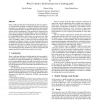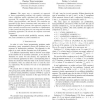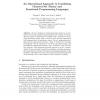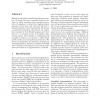1559 search results - page 26 / 312 » The Semantics of Future and Its Use in Program Optimizations |
106
click to vote
ICSE
1995
IEEE-ACM
15 years 5 months ago
1995
IEEE-ACM
Many would argue that future breakthroughs in software productivity will dependon our ability to combine existing pieces of software to produce new applications. An important step...
145
click to vote
EUSFLAT
2009
14 years 11 months ago
2009
This paper uses a constraint set approach to linear programming problems with equality constraints whose coefficients and/or right-hand side values could be uncertain. We consider ...
115
click to vote
TACS
1994
Springer
15 years 6 months ago
1994
Springer
Abstract. We have designed a programming logic based on an integration of functional programming languages with classical set theory. The logic merges a classical view of equality ...
101
click to vote
AAAI
2008
15 years 4 months ago
2008
Recent research in nonmonotonic logic programming has focused on program equivalence relevant for program optimization and modular programming. So far, most results concern the st...
112
click to vote
ENTCS
2000
15 years 1 months ago
2000
Haskell currently lacks a standard operational semantics. We argue that such a semantics should be provided to enable reasoning about operational properties of programs, to ensure...




